
It’s really important to have a regular bowel movement (I’m talking once daily and feeling emptied) for your overall health and even more so when you are suffering from various hormonal imbalances.
Constipation is on top of the list when it comes to digestive issues women experience, so let me assure you it’s not just you.
In desperation many women often resort to laxatives, not realizing that these can perpetuate the constipation cycle, which often has multiple causes.
What is Constipation?
Constipation can take different forms:
- Dry, hard or lumpy stools that are difficult or uncomfortable to pass
- Infrequent stool evacuation – three or less times a week
- Incomplete evacuation – where you feel you are not passing the entire stool that is present
- Feeling you need manual help such doing an enema to empty your colon
Take a look at the Bristol stool chart below. The ideal poop is #3 and #4, passed on a daily basis. If you are chronically experiencing #1 and #2, it’s a sign of constipation.
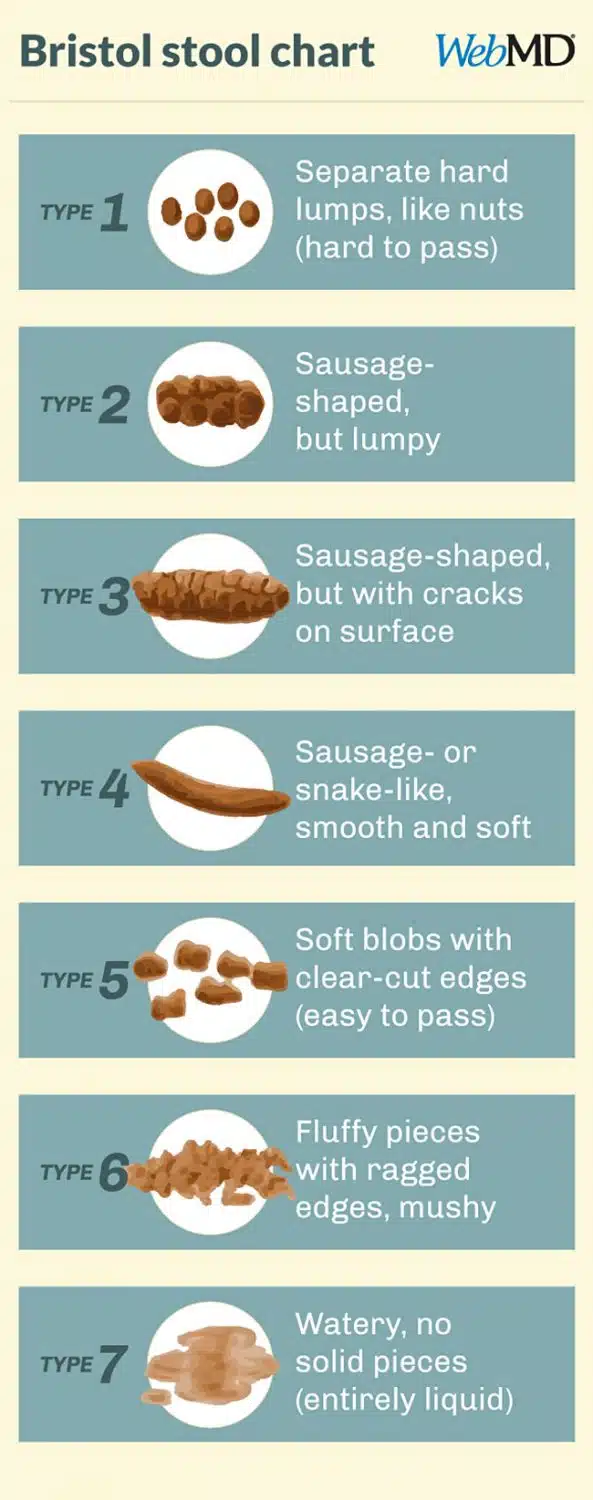
source: WebMD
Causes of Constipation (Not Just a Lack of Fiber and Water!)
Constipation is not one size fits all. It may be due to one or many reasons:
- Fiber: Yes, this could be due to little fiber in your diet, less than 20g per day.
- Water: 50% of women I work with drink way too little quality water. Your bowels need a minimum of one quart of water to form a stool. Juices, tea, and coffee do not count.
- Food intolerances: Dairy and gluten are common culprits that can cause constipation. Learn more about hormone-balancing superfoods with our program, Estrogen Reset.
- Magnesium deficiency: An extremely common cause of constipation and many other symptoms.
- Female Hormone Imbalance: Insulin issues and excess cortisol from stress can cause constipation. Fluctuations during the menstrual cycle can also be a trigger–particularly in the last two weeks of the menstrual cycle when progesterone levels increase. An under-active thyroid gland can also slow your metabolism and digestion, making your bowel sluggish and leading to longer transit time of stools and weaker muscle contractions.
- Poor Gut Bacteria: Lack of the lactobacillus, bifidobacteria, soil and spore-based bacteria can cause constipation.
-
- IBS: People with IBS, or Irritable Bowel Syndrome, often fluctuate between constipation and loose stool. See the gut article (and healing options) I wrote here.
- Low stomach acid and little bile output: Stomach acid initiates a set of chemical processes that break the food down to prepare it for absorption. The bile emulsifies the fats which are key in moving things along. Low stomach acid and/or bile can cause food stagnation. To supplement with a high-quality HCL, try Designs for Health Betaine HCL with Pepsin.
- Medications such as antacids, antidepressants, some blood pressure medicines, cold medicines (like the antihistamines), calcium and iron supplements can cause constipation.
- Emotional triggers: Past trauma and “holding onto things,” some experts say, can play a role.
Constipation Causes Toxicity and Hormonal Imbalances
Researchers at the Danish National Food Institute have studied how the transit time of food affects the colon. They concluded that:
“The longer food takes to pass through the colon, the more harmful bacterial degradation products are produced. (…) Conversely, when the transit time is shorter, we find a higher amount of the substances that are produced when the colon renews its inner surface, which may be a sign of a healthier intestinal wall.”
What about Constipation and Hormones?
When the hormones are used up by the body, they get sent back to the blood. The liver separates them out and they get evacuated in the poop.
When you are constipated, the metabolized hormones re-enter the body; this is not only toxic but it inhibits the endocrine glands from producing more “fresh” hormones for the body to use. Metabolites of the harmful estrogens such as the 16-alpha-hydroxyestrone (the leading cause of breast lumps and cancers) depend on a good bowel movement to be evacuated from the body.
Upshot? Faster food transit time through your bowel = a healthier digestive system and less toxicity, better hormonal balance and fewer chances of leaky gut and related issues like autoimmune diseases.
What Are The Health Risks?
A healthy gut is the foundation of well-being, so constipation can contribute to:
- Abdominal pain and bloating
- Hormonal imbalances
- Lowered immunity due to a rise in unhealthy gut bacteria
- Increased inflammation, which can trigger allergy, food sensitivity and skin rashes
- An uncomfortable sensation of fullness
- Gas and wind that has an unpleasant odor
- Increased risk of colorectal cancer
- Higher likelihood of developing chronic kidney disease
- Laxative dependence: Though laxatives might offer temporary relief, if they are used for weeks or months they can cause lazy bowels – where the muscles in your colon weaken and lose some of their ability to contract, which worsens constipation. This problem occurs after using over the counter laxatives from the pharmacist, but don’t be fooled into thinking that “natural” laxatives are better. Choices like senna (or sennacot) and cassia also cause similar problems and they can initiate the onset of painful cramps as well. So if possible, avoid laxatives and if you do try them as a last resort, limit their use to one or two days.
Foods To Combat Constipation
Food is one of your biggest allies against constipation. Adopt these gut-friendly diet choices and see which ones work best for your body:
Plant Foods, Soluble and Insoluble Fiber
Fruit and vegetables encourage natural hormone balance. They are also high in fiber, which improves digestion, reduces the risk of constipation, can assist in moving food along the digestive tract and stabilizes blood glucose levels, which stabilizes insulin levels. Eating plenty of fiber also reduces other digestive conditions such as diverticulitis (small pouches in the colon and hemorrhoids (small often painful, bulging veins located in or near the anus).
High fiber veggies include tomatoes, avocado, broccoli, carrots, peas, and beans. There are two main forms of fiber and it is good to eat both:
- Insoluble Fiber: This is found in many vegetables (particularly the skin), nuts and whole grains like buckwheat and quinoa. This type of fiber works a little like a broom through the bowel – it increases stool bulk so it can help to prevent constipation and encourage regular bowel habits.
- Soluble Fiber: This contains plant cells such as pectin and gums. It forms a gel-like substance when it combines with fluid – which acts as a natural lubricant to soften your stool. Soluble fiber is found in foods like lentils, asparagus, avocado, apples, oats, peas, and barley.
The US Food and Nutrition Board of the Institute of Medicine recommend that women under 50 have a fiber intake of 25 g/day and over 50, have 21 g/day. To help you get your head around that:
- ¼ of a cup of beans = 3g of fiber
- 2 cups of mixed raw vegetables = 10g
- 1 apple (with skin) and 1 orange = 5.5g
But when it comes to fiber it is important to listen to your body. If you don’t usually eat a great deal of fiber, increase levels slowly to minimize issues like bloating, flatulence and tummy discomfort, which can occur as your body adjusts. If you suffer from slow-transit constipation, fiber could actually make your constipation worse, so don’t overdo it.
For a new high fiber recipe option, try my recipe for Lentil Stew or Oat Flour Muffins with Berries and Pistachios.
Flaxseed
These are a known cure for constipation because of their natural oils and mucilaginous content, which adds bulk to your stool, helping speed up its transit time through the bowel.
Eat them raw, ground and added to dishes like breakfast bowls and healthy smoothies.
If that does not help, here is my favorite trick, especially when I travel (and tend to get constipated): Take 2 tablespoons of whole flaxseed (not ground) in a 16-ounce glass of filtered water before bed. The seeds will plump up and due to their slimy nature, they will evacuate things nicely.
Herbal Bitters
These stimulate digestion, particularly by boosting the production of bile acids, which are produced in the liver and are natural laxatives that also help break down fats. Recent research shows that a new drug that stimulates bile increases bowel movements by helping to soften stool and encourage their progression through the colon.
But you don’t need to take a drug to do this. Bitter herbs can stimulate bile production. To kick-start, this process at the beginning of meals have a small salad that contains arugula, chicory, endive, or other dark, leafy greens such as radicchio. You can also increase beneficial bile by drinking tinctures and teas made from chamomile, dandelion, gentian, goldenseal, peppermint, milk thistle and wormwood (dandelion root from tea can have a strong laxative effect in some people).
For a great meal starter, try my recipe for Bitter Greens with Sautéed Mushrooms.
Try Wellena’s Digestive Bitters here.
MCT Oil, Olive or Coconut Oil
A flat tablespoon can act as a natural lubricant, to help foods more easily pass through your digestive system. To check how well you tolerate fats, start it with a teaspoon and increase to a tablespoon. MCT oil is particularly effective here.
Water
Calculate the amount of water you need to drink daily by halving your weight in pounds – this is the amount of water you need to drink in ounces. If you weigh 120 pounds, you need to drink 60 oz of water per day. And, 20 to 30% more if you exercise.
Your body weight is made up of about 60% fluid so water is pivotal to important bodily functions like digestion, metabolism and muscle contraction. You are also constantly losing fluid through breathing, perspiration, and other bodily functions. If you feel thirsty you have already become dehydrated, which can slow the transit time of food through your bowel and increase the risk of your poop compacting.
Hot watery drinks can also help stimulate bowel movements. So start your day with a glass of warm water with 2 tablespoons of freshly squeezed lemon juice.
Fermented Foods
Sauerkraut, miso, kvass, and ferments like coconut kefir and kimchi (Korean fermented vegetables) are packed with beneficial bacteria. These probiotics can help to improve gut transit time, stool frequency, and stool consistency, shows research from Kings College London.
So add some fermented food into your diet every day, such as my Quick Sauerkraut Salad recipe.
I have also found that these spore-based probiotics can help with constipation by regulating the whole gut microflora (the spores are like the “cops” and traffic controllers in the gut).
Herbal Teas
This can be used as herbal medicine to improve gut health, alleviate discomfort from constipation and relax gut muscles, which helps to restore the natural peristaltic motion that moves stools along the digestive tract. Try:
- Peppermint: This refreshing tea has anti-spasmodic effects which allow better emptying of the bowel. It also helps activate “anti-pain” channel in the colon, which soothes and settles the colon according to research by the Nerve-Gut Research Laboratory at the University of Adelaide in Australia.
- Chamomile: This stimulates the production of glycine, which relaxes nerves and muscle spasm in the bowel and levels remain elevated for up to two weeks.
Natural Remedies – Minerals and Herbs
Magnesium Supplements
Magnesium is a muscle relaxant. In the intestines, it helps to calm spasms so that the muscle contractions that move food along are smoother. It also attracts water, drawing it into the bowels, which helps soften your stool, easing progress and assisting faster elimination. Powdered forms of magnesium citrate are absorbed more rapidly so they are optimal to help constipation. If you don’t already take magnesium, start with a smaller dose to see how you tolerate it (you don’t want to go from constipation to having the runs)! Replenish by starting with 500mg and go up to 1500mg, if needed.
Preferred form: citrate (can cause loose stool or diarrhea), glycinate, or malate, avoid oxide.
Try: Wellena Magnesium Citrate Plus
We’ve just enhanced the formula by adding these two powerful herbs:
Triphala – this Ayurvedic 3-berry blend aid digestion, assimilation, and elimination
Cape Aloe – supports gastrointestinal regularity and smooth evacuation.
To learn more about how to balance your hormones with supplements (and which to take), you can download our FREE Supplement Guide here.
Slippery Elm
When mixed with water, this cooling and healing bark turns into a mucilaginous gel that protects and soothes the lining of your gut, reducing inflammation. Taken regularly, it can keep fecal matter more moist and slippery as it moves through your digestive system. It also helps to naturally balance hormones by boosting good bacteria. In turn, the good bacteria produce an enzyme that helps your inactive T4 thyroid hormone convert into the active T3 hormone, stabilizing thyroid function, which can further reduce constipation.
Aloe Vera
This is classified by the FDA as a stimulant laxative. It contains anthraquinones and anthrones, which increase your peristaltic motion.
Psyllium
This fibrous, soluble fiber comes from seed husks and they help to soften and bulk up your stool to smooth its transition through your body. Start by adding 1 teaspoon per day to your drink, smoothie, or just have it with plain water.
Other Remedies: Touch, Movement, and Mindset
Perineal Self-Acupuncture
The perineum is the area between your anus and your genitals. In the final trimester of pregnancy, women are encouraged to massage their perineum to make it healthier and more supple in readiness to stretch during childbirth. Now research from the University of California has shown that when people with constipation apply gentle external pressure or massage to the area this can help trigger a bowel movement.
Yoga
Postures such as child’s pose, plow pose, butterfly pose and sitting with a half-spinal twist, can help stimulate movement in your bowel and relieve excess spasm and wind.
Abdominal Massage
This can help to get your poop moving and also alleviate abdominal pain. An added bonus – it is also relaxing and pleasurable. To encourage your stool to move in the right direction, massage from your right side to your left.
De-Stressing
Stress can create spasm that causes pain and interferes with your natural peristaltic motion. Adrenal fatigue and cortisol issues from chronic stress can also lead your gut to be deprived of the nourishment it needs to stay healthy and function properly. For more information see my post on the subject.
Addressing Past Trauma
Low mood compromises the function of your body and brain, so people with depression are more likely to suffer constipation.
Psychological and emotional traumas such as the death of a loved one, divorce, natural disasters, accidents, bullying or other forms of abuse can also contribute to constipation by triggering irritable bowel syndrome, shows research.
That’s good reason to make sure you address lingering emotional wounds through counseling or techniques including Emotional Freedom Technique (which involves tapping on release points) and EMDR (eye movement desensitization and reorganization) where you change the way you process memories and thoughts of a traumatic event.
Developing Healthy Toilet Habits
Just as your body can benefit from techniques to improve breathing and standing, it can also benefit from healthy habits and techniques when you go to the toilet. These include:
- Responding to toilet urges: Where possible, never hold on when you have the urge to go. If you do, it can cause spasm in your colon. If you hold on often, you can actually damage the tone and strength of your bowel muscles, which can become slacker and less adept at moving digesting food along your digestive tract. Over time this can lead to delayed transit time until you poop.
- Have you heard of the Squatty Potty? I personally have it and love it! You can check it out here. Going to the bathroom has never been the same. I grew up in Asia where “squat toilets” are the norm and I intuitively always chose them (rather than the Western sit-down toilet) – now I know why; by lifting up your legs, you get your colon into a straighter position and evacuate more effectively.
- Utilize the gastrofolic reflex: This is an urge to pass a bowel motion and it usually occurs around 20 minutes after eating a meal so where possible, take advantage of it. If you then are too busy racing off to work or getting the kids to bed, you will be missing out on this helping hand and also holding on to your bowel motion, which as I discussed, can cause cramping and muscle damage.
- Regular pelvic floor exercises: The pelvic floor is like a hammock of muscles stretched across the floor of the pelvis and supporting organs like your bladder and bowels. If the muscles are weak you get a reduction in the sensation and response needed to stimulate bowel motions. To keep your pelvic floor in shape do regular Kegel exercises – where you contract your pelvic floor muscles.
As you can see, there are many things we can do to establish good bowel movements. I recommend starting with the food adjustments as I see them making the biggest difference in your daily toilet habits.
Learn more with Overcoming Estrogen Dominance
“The body has an amazing ability to heal. We just need to give it the right resources.”
In Overcoming Estrogen Dominance, my goal is to empower and give you the tools to take control of your hormones and health.
More than 70% of women experience estrogen dominance. The symptoms range from lumpy and fibrocystic breasts to thyroid nodules, hot flashes, fibroids, uterine polyps, painful, heavy or irregular periods to infertility and miscarriages, from mood swings to insomnia, weight gain to fatigue.
So many women have experienced the pain and frustration that comes when they feel their symptoms and complaints are dismissed or minimized. This is particularly true for women who are experiencing the symptoms of hormone imbalance. Even when doctors do offer treatment, it’s typically in the form of prescription medication or invasive surgical procedures.
In Overcoming Estrogen Dominance, I hope to show that those extreme interventions are often unnecessary, and to give women a roadmap to reverse estrogen dominance using food, herbs, supplements and natural protocols to rebalance hormones.
To get your copy of Overcoming Estrogen Dominance, go here.

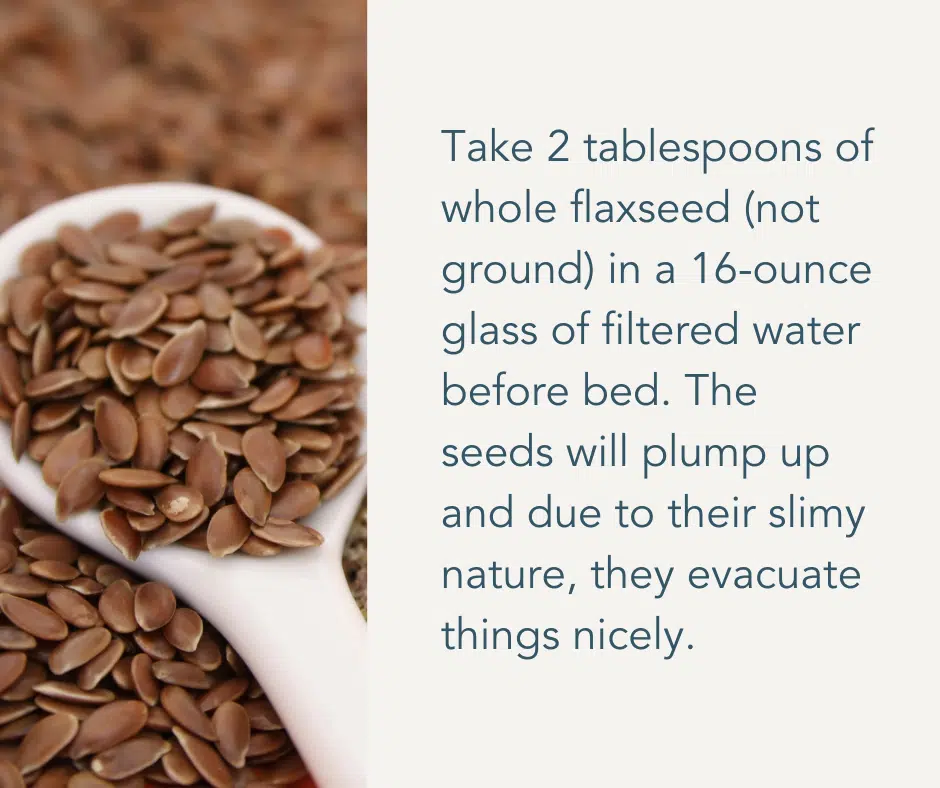
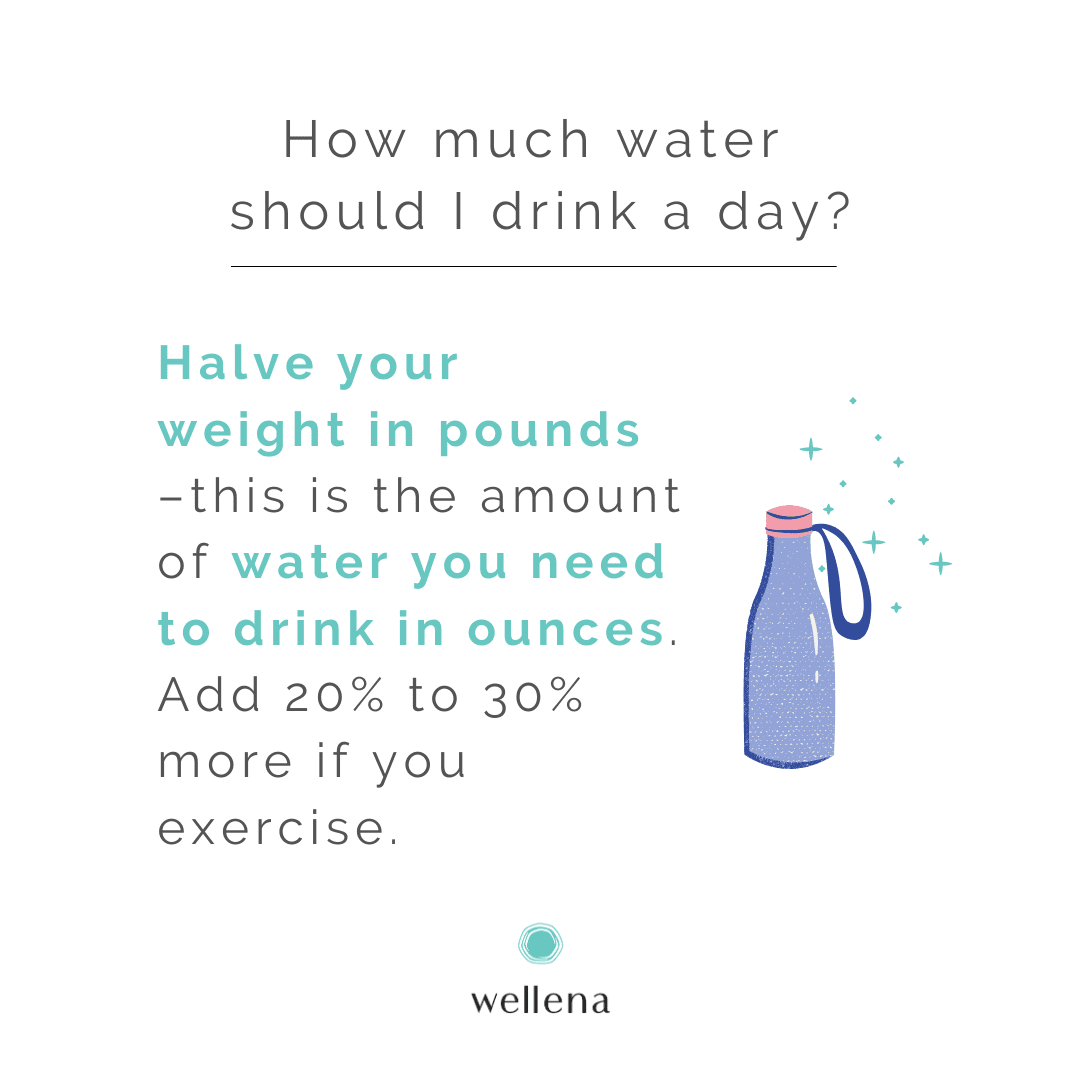

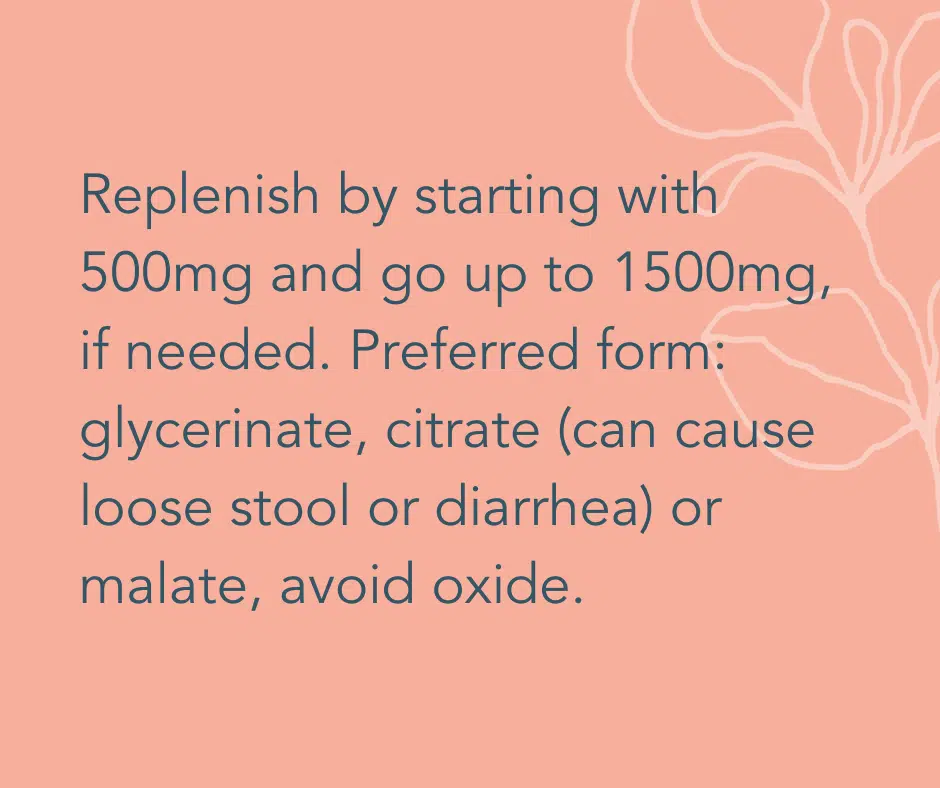
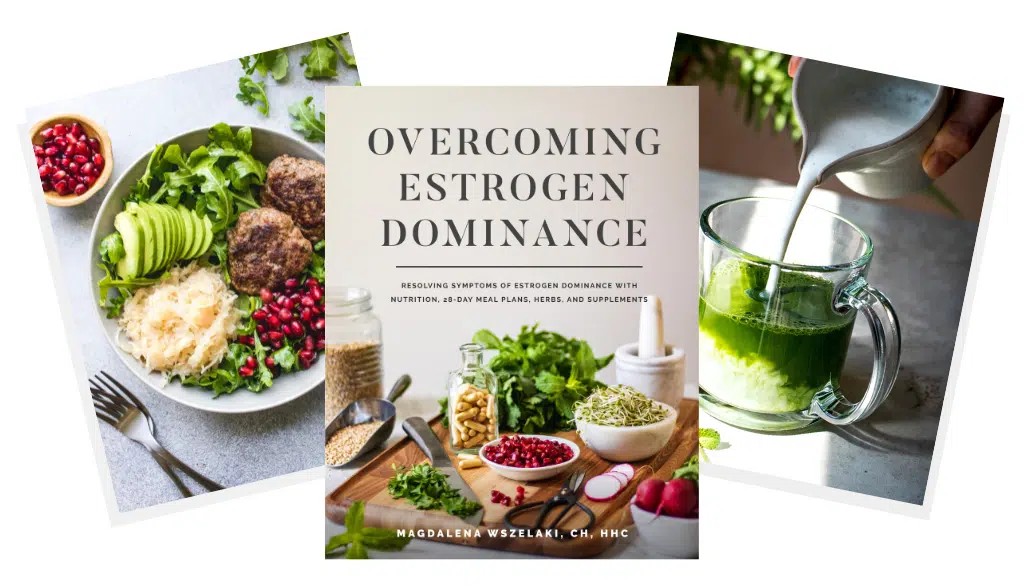
Thank you very helpful 😃
Hi Colleen,
Great! Thank you for sharing ~Deanna HB Team
Excellent article covering all aspects of the problem and the various reasons that can trigger it as well as the he various solutions are remarkable ..will surely share it ,,, it would help several people I know … thanks you 🌷
HI Meeru,
It is wonderful of you to share this with others 🙂 ~Deanna HB Team
Excellent Info , thumbs up
Thank U 🙂
Hi Prosperity,
We appreciate your feedback! ~Deanna HB Team
Thank you for this very comprehensive and helpful article.
Thank you Sonia! ~Deanna HB Team
Thank you for such a comprehensive guide on managing constipation. I travel fairly often, and always experience traveler’s constipation, except for two destinations: for some reason I never have constipation when I go to Australia or Thailand!
I’ve always wondered why that is.
Curious! Do you eat differently while there? ~Deanna HB Team
Thank you this info came at the right time lol
Wonderful! ~Deanna HB Team
I am curious on this as well
Though my understanding is that tea or tisanes (herbal teas) have tannins with interfere with absorption, namely iron absorption.
Also, any caffeinated teas will also be a diuretic, not all herbal teas are caffeine free. So, this would actually cause dehydration, depending on the amount drank in a day.
That’s my, unprofessional, unqualified opinion.
Hopefully the author chimes in 🙂
[…] this article to learn how constipation can cause hormone […]
[…] All undigested or digested unwanted foods, toxic metabolites which are not required in your system anymore are supposed to form your stool and flush out from your body. Holding all such toxic materials inside creates an unhealthy atmosphere in the gut. Study shows that good bacteria in our gut enhance our immunity, improve the symptoms of depression, combat obesity and multiple other health benefits. (11) But toxic gut environment not only kills most of the good bacteria but also encourage the growth of bad bacteria. When you are constipated all the metabolized hormone re-enter your body which inhibits the endocrine gland to produce fresh hormones creating a hormonal imbalance. (12) […]
Why aren’t herbal teas considered part of one’s water intake when they are sugar and dairy-free? Thank you.
Hey Heide,
Herbal teas like peppermint, chamomile, marshmallow root and licorice root, can actually be great for hydration. Check out a brand we love, Pique tea, and their blog post regarding this matter.
https://blog.piquetea.com/is-tea-a-diuretic/
*For a special discount on piquetea, check out our unique link: https://hormonesbalance.com/allthingswelove/product-brand/pique-tea/
Healthy Regards,
HB Team
Hi,
This is great information. I am struggling with constipation now. I believe it is my pressure medicine. I will follow some of these suggestions and this information will be passed along to others.
You mention avoiding oxide forms of magnesium? This contradicts other information I’ve read, can you share more?
Hi Renee, the reason is the mag oxide is one of the lowest absorbable forms, and often one of the cheapest forms, so we prefer a much more bioavailable form like Magnesium Replenish which is magnesium glycinate, or when constipation is a bigger issue Magnesium Citrate.
Here are links for you.
https://wellena.com/collections/single-products/products/magnesium-replenish-1
https://wellena.com/collections/single-products/products/magnesium-citrate-1
HB Team
Hi – interesting article thank you. Can I take magnesium citrate with histamine intolerance? Thanks Lisa
HI Lisa, mag citrate is higher histamine, so we would recommend Magnesium Glycinate instead, like our Magnesium Replenish.
This is wonderful information, Magdelena, absolutely wonderful. I have a abdominal scar from left hip to left ribcage from botched salingo ooperectomy hysterectomy at age 32. The gastroentrologist I went to said that my problems were related to that and offered NO solutions. None. I am using castor oil pac and self massage to break up adhesions, but I still suffer
constipation and will move forward to Magnesium Citrate. I have been wandering in this desert, going around this mountain for over 40 years. I’m finally well enough to mentally confront the trauma and “receive” solutions. Thank you for this article.
Patricia, try Lumbrokinase to break up adhesions and scar tissues. My husband has suffered from hernia scars, and now, after a few months of taking it daily, is pain free and can get back to enjoying chores, yard work, and daily walks. Note: best to take on empty stomach.
Hi, thanks for all the useful information on your blog. I have never had a problem with constipation until I started adding in all the healthy recommendations so I was wondering if maca or camu camu can cause constipation?
Thank you
Hi Melaine, I don’t know specifically that those two cause constipation, but anytime we make diet changes, it can shift things. So listen to the signals your body is giving you, and you may need to add in some of the tips above to help support your digestion. Magnesium is a great start if you are not already taking it. Take care – Jennifer @ HB Support
Thanks for the article.
Under Fermented Foods, the link to Spore-Based Probiotics is mis-linking to the HCl product. Can you please correct it, or let me know which probiotic Magdalena is recommending?
Thank you!
HI Monica, Megasporebiotics, is the sporebiotics that we recommend. Have a great day!
Jennifer @HormonesBalance